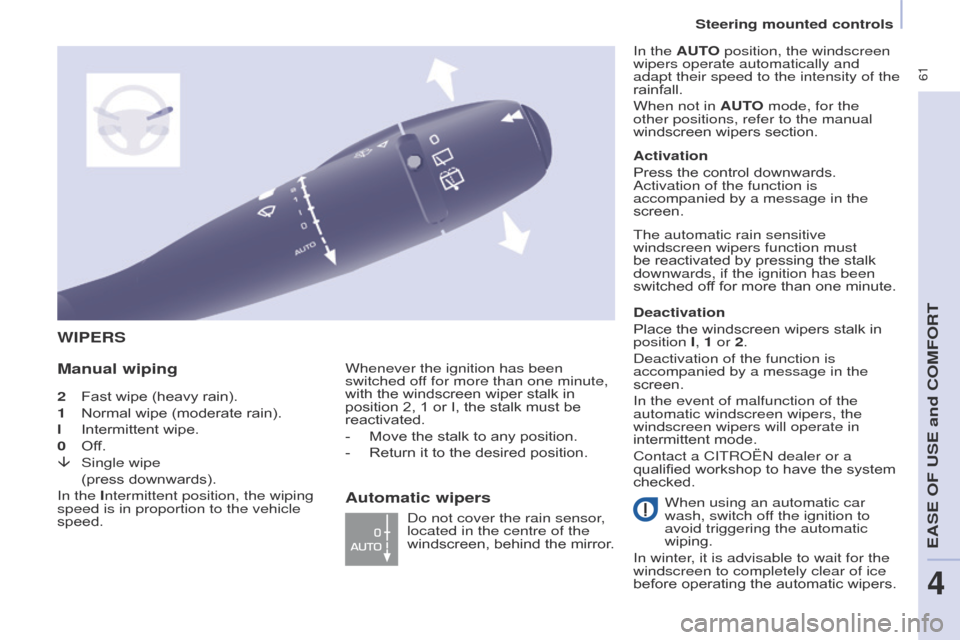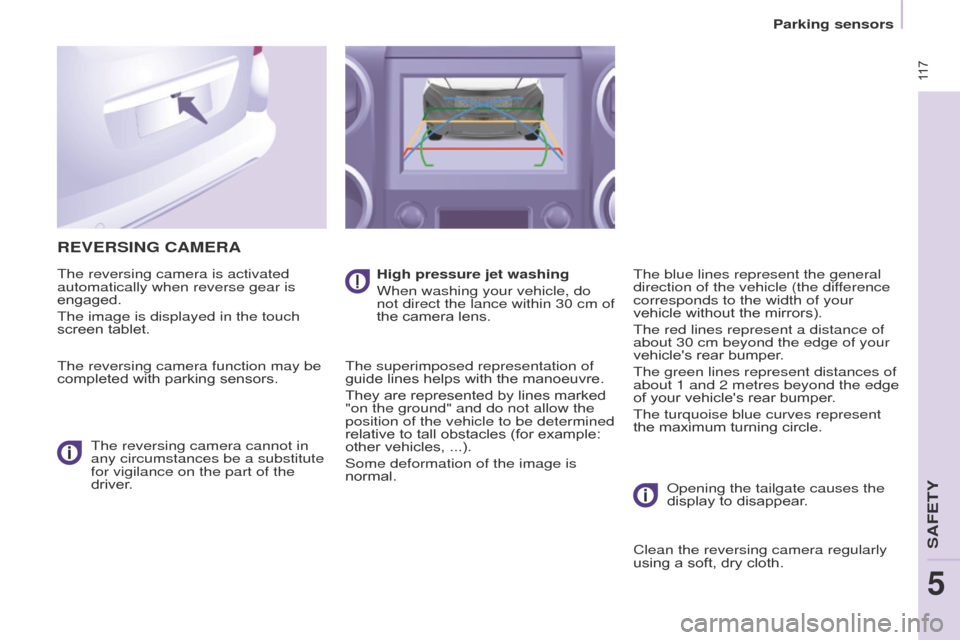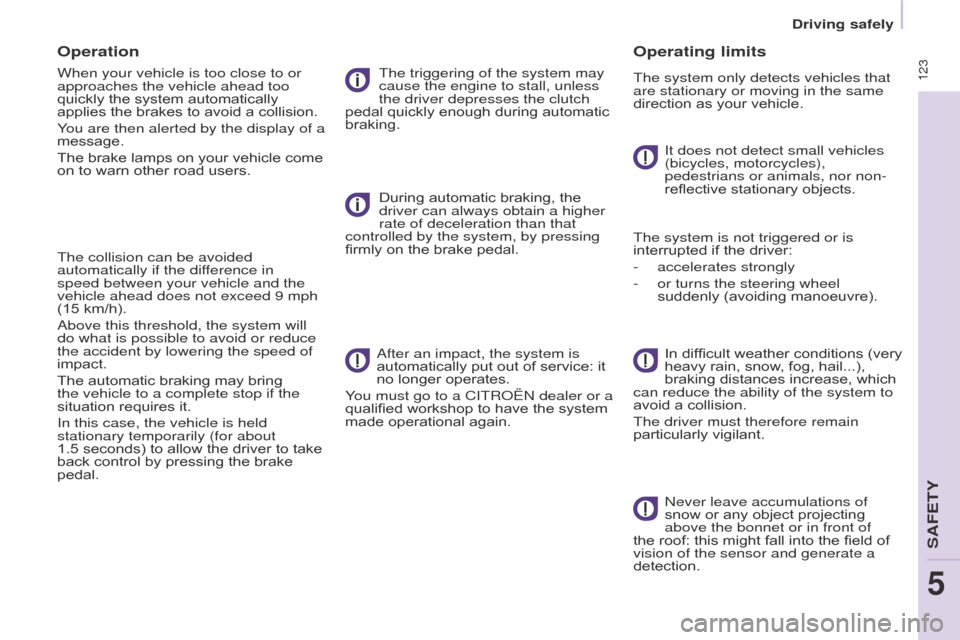sensor Citroen BERLINGO MULTISPACE RHD 2017 2.G User Guide
[x] Cancel search | Manufacturer: CITROEN, Model Year: 2017, Model line: BERLINGO MULTISPACE RHD, Model: Citroen BERLINGO MULTISPACE RHD 2017 2.GPages: 292, PDF Size: 10.19 MB
Page 62 of 292

60
Berlingo2VP_en_Chap04_Ergonomie_ed02-2016
If the sunshine sensor
does not function correctly,
the lighting comes on
accompanied by the service
warning lamp, an audible
signal
and a message in the screen.
Contact a CITROËN dealer or a
qualified
workshop.
Guide-me-home lighting
Keeping the dipped beam headlamps
on temporarily with the ignition off,
makes the driver's exit easier when the
light
is poor.
HEADLAMP BEAM
The beam setting must be adjusted to suit
the load in the vehicle.
0 -
No load.
1 -
Partial load.
2 -
A
verage load.
3 -
Maximum authorised load.
Manual operation
-
With
the
ignition
off,
"flash"
the
headlamps within one minute after
switching
off
the
ignition.
The guide-me-home lighting switches
off
automatically
after
a
set
time.
Automatic operation
Refer to chapter 10, "Screen
menu
map"
section. Initial setting is position 0.
Activate the function via the
vehicle
configuration
menu. Programming
The system is activated or deactivated
in
the
vehicle
configuration
menu.
The
system
is
activated
by
default.
Switching off
The
system
does
not
operate:
-
below a certain angle of rotation of
the steering wheel,
-
above
25
mph
(40
km/h),
-
when
reverse
gear
is
engaged.
Switching on
This
function
starts:
-
when the corresponding direction
indicator is switched on,
or
-
from a certain angle of rotation of
the
steering
wheel.
With dipped or main beam headlamps,
this
function
makes
use
of
the
beam
from a front foglamp to illu
minate the
inside of a bend, when the vehicle
speed is below 25 mph (approximately
40
km/h)
(urban
driving,
winding
road,
intersections,
parking
manoeuvres...).
CORNERING LIGHTING
Travelling abroad
If using your vehicle in a country
that drives on the other side of the
road,
the headlamps must be adjusted
to
avoid dazzling on-coming drivers.
Contact a CITROËN dealer or a
qualified
workshop.
The function is deactivated temporarily
when you use the manual lighting
control
stalk.
Steering mounted controls
Page 63 of 292

61
Berlingo2VP_en_Chap04_Ergonomie_ed02-2016
2 Fast wipe (heavy rain).
1
Normal
wipe (moderate rain).
l
Intermittent
wipe.
0
Of
f.
â
Single wipe
(press
downwards).
In the Intermittent position, the wiping
speed is in proportion to the vehicle
speed.
WIPERS
Manual wipingWhenever the ignition has been
switched off for more than one minute,
with
the windscreen wiper stalk in
position
2, 1 or I, the stalk must be
reactivated.
-
Move
the stalk to any position.
-
Return
it to the desired position.
Do not cover the rain sensor,
located in the centre of the
windscreen,
behind the mirror.Activation
Press
the control downwards.
Activation of the function is
accompanied by a message in the
screen.
Deactivation
Place
the windscreen wipers stalk in
position
I, 1 or 2.
Deactivation of the function is
accompanied by a message in the
screen.
In the event of malfunction of the
automatic windscreen wipers, the
windscreen wipers will operate in
intermittent
mode.
Contact a CITROËN dealer or a
qualified
workshop to have the system
checked. In the
AUTO position, the windscreen
wipers operate automatically and
adapt their speed to the intensity of the
rainfall.
When not in AUTO mode, for the
other positions, refer to the manual
windscreen wipers section.
The automatic rain sensitive
windscreen wipers function must
be reactivated by pressing the stalk
downwards, if the ignition has been
switched
off for more than one minute.
When using an automatic car
wash, switch off the ignition to
avoid triggering the automatic
wiping.
In winter, it is advisable to wait for the
windscreen to completely clear of ice
before
operating the automatic wipers.
Automatic wipers
Steering mounted controls
EASE OF USE and COMFORT
4
Page 74 of 292

72
Berlingo2VP_en_Chap04_Ergonomie_ed02-2016Berlingo2VP_en_Chap04_Ergonomie_ed02-2016
Good practice
For maximum cooling or heating of the
passenger compartment, it is possible
to exceed the value 15 by turning until
LO is displayed or the value 27 by
turning
until HI is displayed.
On entering the vehicle, the inside
temperature may be much colder
(or
warmer) than is comfortable.
There
is no advantage in changing the value
displayed
in order to quickly reach the
level
of comfort required.
The
system
will use its maximum performance to
reach
the comfort value set.
DIGITAL AIR CONDITIONING
Automatic operation
AUTO comfort programme
This is the normal air conditioning
system
operating mode. Driver or passenger side comfort
value
The value indicated in the screen
corresponds to a level of comfort and
not a temperature in degrees Celsius
or
Fahrenheit.
Turn this control to the left
or to the right to decrease or
increase the value.
A
setting
around the value 21 provides
optimum
comfort. However,
depending on your requirements, a
setting
between 18 and 24 is usual.
Do not cover the sunshine sensor
located on the dashboard.
Press this button, the AUTO
symbol
is displayed.
The system controls the
distribution,
the flow and the
intake
of air to guarantee
comfort
and a sufficient circulation
of air in the passenger compartment
according
to the comfort value set. No
further
action on your part is required.Air
flow will increase gradually when
the
engine is cold, to prevent excessive
distribution of cold air.
For your comfort, the settings are
stored when the ignition is switched off
and are reinstated the next time the
vehicle is started.
The automatic function will no longer
be maintained if you change a setting
manually (AUTO is cleared).
SEPARATE SETTINGS FOR DRIVER AND
PASSENGER
Ventilation
Page 117 of 292

11 5
Berlingo2VP_en_Chap05_Securite_ed02-2016
The audible (front and rear) and visual
(rear) parking sensor system consists
of proximity sensors, installed in the
rear
bumper.
The sensors detect any obstacle which
enters
its field of operation: person,
vehicle, tree, fence, behind the vehicle
during
the manoeuvre.
Certain
objects detected at the
beginning of the manoeuvre will no
longer be detected at the end of the
manoeuvre due to the blind spots
between
and below the sensors.
Examples:
stake, roadworks cone or
pavement
post.
Engage reverse gear
P
ARKING
SENSORS
Display in the screen
An
audible
signal
confirms
the
activation of the system by engaging
reverse
gear.
The proximity information is indicated
by an audible signal which becomes
more rapid as the vehicle approaches
the
obstacle.
When the distance between the rear
of the vehicle and the obstacle is less
than approximately thirty centimetres,
the audible signal becomes
continuous.
Parking sensors
SAFETY
5
Page 118 of 292

11 6
Berlingo2VP_en_Chap05_Securite_ed02-2016
Activation / DeactivationMalfunction
In the event of a malfunction, the LED
in the button comes on, accompanied
by an audible signal and a message in
the
screen.
Contact
a CITROËN dealer or qualified
workshop.
Good practice
In bad weather or in winter, ensure that
the sensors are not covered with mud,
ice or snow.
The system will be deactivated
automatically if a trailer is being towed
or
if a bicycle carrier is fitted (vehicle
fitted
with a towbar or bicycle carrier
recommended
by CITROËN).
You can activate or deactivate
the system by pressing this
button.
The activation or deactivation
of the system is stored when
the
vehicle
stops.
Engage forward gear
In addition to the rear parking sensors, the front parking sensors are triggered
when an obstacle is detected in
front of the vehicle and the speed
of the vehicle remains below 6 mph
(10 km/h).
The
tone from the speaker (front
or rear) allows an obstacle to be
identified
as either in front of or
behind
the vehicle.
Stop the assistance
Change to neutral. The parking sensor system
cannot, in any circumstances,
take
the place of the vigilance and
responsibility
of the driver.
Parking sensors
Page 119 of 292

117
Berlingo2VP_en_Chap05_Securite_ed02-2016
REVERSING CAMERA
The reversing camera is activated
automatically when reverse gear is
engaged.
The image is displayed in the touch
screen tablet.
The reversing camera function may be
completed
with parking sensors.
The reversing camera cannot in
any circumstances be a substitute
for vigilance on the part of the
driver. High pressure jet washing
When washing your vehicle, do
not direct the lance within 30 cm of
the
camera lens.
The superimposed representation of
guide
lines helps with the manoeuvre.
They
are represented by lines marked
"on the ground" and do not allow the
position of the vehicle to be determined
relative
to tall obstacles (for example:
other
vehicles, ...).
Some deformation of the image is
normal. The blue lines represent the general
direction of the vehicle (the difference
corresponds to the width of your
vehicle
without the mirrors).
The red lines represent a distance of
about 30 cm beyond the edge of your
vehicle's
rear bumper.
The green lines represent distances of
about 1 and 2 metres beyond the edge
of
your vehicle's rear bumper.
The turquoise blue curves represent
the
maximum turning circle.
Opening the tailgate causes the
display
to disappear.
Clean the reversing camera regularly
using
a soft, dry cloth.
Parking sensors
SAFETY
5
Page 124 of 292

122
Berlingo2VP_en_Chap05_Securite_ed02-2016
ACTIVE CITY BRAKE
Active City Brake is a driving assistance system that aims to avoid
a frontal collision or reduce the speed
of an impact if the driver does not
react
sufficiently (inadequate brake
application).
This system is designed to
improve
driving safety.
It remains the driver's responsibility to
continuously monitor the state of the
traffic
and to assess the distances and
relative
speeds of other vehicles.
Active
City Brake can in no
circumstances replace the need for
vigilance
on the part of the driver. Never
look at the laser sensor
through an optical instrument
(magnifying
glass, microscope...)
at a distance of less than
10 centimetres:
risk of eye injury.Principle
Using a laser sensor located at the top
of the windscreen, this system detects
a vehicle running in the same direction
or stationary ahead of your vehicle.
When
necessary, the vehicle's braking
system is operated automatically
to avoid a collision with the vehicle
ahead.
Automatic
braking occurs later
than if done by the driver
, so as
to intervene only when there is a
high
risk of collision.
Conditions for activation
Active City Brake only operates if the following conditions are met:
●
ignition
on,
●
the
vehicle is in a forward gear,
●
speed
is between about 3 and
18 mph
(5 and 30 km/h),
●
the
braking assistance systems
(ABS,
EBFD, emergency braking
assistance) are not faulty
,
●
the
trajectory control systems
(ASR, DSC) are not deactivated
or
faulty,
●
the
vehicle is not in a tight corner,
●
the
system has not been triggered
during
the previous 10 seconds.
Driving safely
Page 125 of 292

123
Berlingo2VP_en_Chap05_Securite_ed02-2016
Driving safely
Operation
When your vehicle is too close to or
approaches the vehicle ahead too
quickly the system automatically
applies
the brakes to avoid a collision.
You are then alerted by the display of a
message.
The
brake lamps on your vehicle come
on
to warn other road users.
The collision can be avoided
automatically if the difference in
speed
between your vehicle and the
vehicle ahead does not exceed 9 mph
(15
km/h).
Above this threshold, the system will
do what is possible to avoid or reduce
the accident by lowering the speed of
impact.
The
automatic braking may bring
the vehicle to a complete stop if the
situation
requires it.
In this case, the vehicle is held
stationary temporarily (for about
1.5 seconds)
to allow the driver to take
back
control by pressing the brake
pedal. The triggering of the system may
cause the engine to stall, unless
the driver depresses the clutch
pedal
quickly enough during automatic
braking.
During
automatic braking, the
driver can always obtain a higher
rate of deceleration than that
controlled by the system, by pressing
firmly
on the brake pedal.
After an impact, the system is
automatically
put out of service: it
no
longer operates.
You must go to a CITROËN dealer or a
qualified
workshop to have the system
made
operational again.
Operating limits
The system only detects vehicles that
are stationary or moving in the same
direction as your vehicle.
It does not detect small vehicles
(bicycles, motorcycles),
pedestrians or animals, nor non-
reflective
stationary objects.
The system is not triggered or is
interrupted
if the driver:
-
accelerates strongly
-
or turns the steering wheel
suddenly
(avoiding manoeuvre).
In
difficult weather conditions (very
heavy
rain, snow, fog, hail...),
braking
distances increase, which
can reduce the ability of the system to
avoid
a collision.
The driver must therefore remain
particularly
vigilant.
Never leave accumulations of
snow
or any object projecting
above the bonnet or in front of
the
roof: this might fall into the field of
vision of the sensor and generate a
detection.
SAFETY
5
Page 127 of 292

125
Berlingo2VP_en_Chap05_Securite_ed02-2016
Driving safely
Operating faults
Sensor fault
The operation of the laser sensor may
suffer interference from accumulations
of dirt or misting of the windscreen.
In this case you are warned by the
display
of a message.
Use the windscreen demisting
and regularly clean the area of the
windscreen
in front of the sensor.
Do
not stick or otherwise fix any
object
on the windscreen in front
of
the sensor. System fault
In the event of a malfunction of the
system, you are warned by an audible
signal and the display of the message
"Automatic braking system fault".
Have
the system checked by a
CITROËN
dealer or a qualified
workshop.In the event of an impact to
the windscreen at the sensor
,
deactivate the system and contact
a
CITROËN dealer or a qualified
workshop
to
have
your
windscreen
replaced.
Never
try to remove, adjust or test
the
sensor.
Only a CITROËN dealer or a
qualified
workshop is able to work
on
the system.
When towing a trailer or when the
vehicle is being towed, the system
must
be deactivated.
SAFETY
5
Page 151 of 292

149
Berlingo2VP_en_Chap06_Accessoire_ed02-2016
Good Practice
In certain cases of particularly arduous
use (towing the maximum load up a
steep slope in high temperatures), the
engine automatically limits its power.
In this case, the air conditioning is
automatically cut of
f to save engine
power.
Tyres
Check
the tyre pressures of the towing
vehicle and of the trailer
, observing the
recommended
pressures.
Chapter
7, "Levels" section.
If the coolant temperature
warning lamp comes on, stop
the vehicle and switch off the
engine
as soon as possible.Brakes
Towing
increases the braking distance. Drive at a moderate speed, change
down
early and brake gradually.
Towbar
We recommend the use of genuine
CITROËN towbars and their wiring
harnesses, which have been tested
and approved from the design stage of
your vehicle, and that you entrust the
fitting
of this equipment to a CITROËN
dealer
.
If
this equipment is not fitted by a
CITROËN dealer
, it is imperative that
it
is fitted using the electrical pre-
equipment installed at the rear of the
vehicle and in accordance with the
manufacturer's
instructions.
In accordance with the general
instructions a reminder of which has
been given above, we draw your
attention
to the risk associated with
fitting
a towbar or electrical accessory
not
recommended by CITROËN.
Fitting such equipment could result in
the failure of your vehicle's electronic
system.
Please obtain information from
the
Manufacturer before fitting this type
of
equipment.
Side wind
Sensitivity
to
side
wind
is
increased.
Drive smoothly and at a moderate
speed.
ABS/DSC
The
ABS or DSC systems only control
the
vehicle,
not
the
trailer
or
caravan.
Parking sensors
The
rear
parking
sensors
system
does
not
function
while
the
vehicle
is
towing.
Chapter
9,
"Identification
markings"
section.
Towing a trailer
ACCESSORIES
6